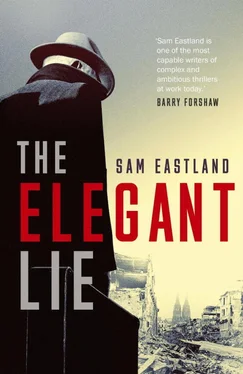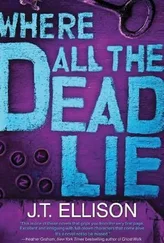‘You might’◦– Dasch paused dramatically◦– ‘if you were on your honeymoon.’
‘But since I’m not—’
‘Oh, but you are!’ exclaimed Dasch. ‘You will be married to my daughter. Temporarily, of course, but you will travel together as newlyweds. If anyone asks you why you are going, that is all you’d have to tell them, and they would understand.’
‘And when we get there,’ asked Carter, ‘assuming that Teresa doesn’t murder me before we arrive?’
‘You will travel out into the countryside, perhaps to take a picnic. You will go walking in the forest where you will stumble, quite by accident it seems, upon the wreckage of that plane. And then you will see to it that nothing remains by which its cargo can be traced back to us, or to our client.’
‘It won’t work,’ Carter said flatly.
The expression froze on Dasch’s face. ‘Why not?’ he asked.
‘Because of Teresa. It will put her at risk! You have kept her away from your affairs until now◦– you know the ones I mean◦– but all of that will be for nothing if you drag her into this.’
‘Don’t you think I have considered that?’ asked Dasch, his voice rising with indignation. ‘We simply won’t tell her why she’s going. All she will know is that she is accompanying you on a trip, on which you have some business to conduct. If anyone asks her, that’s all she’d be able to tell them.’
Carter shook his head, still unconvinced. ‘That will not be enough to keep her out of danger. Let me go alone, instead. This way, she does not need to be involved.’
‘That is a fine gesture,’ said Dasch, ‘but any man travelling by himself to such a location is bound to raise suspicions, and even if you can conjure up some rationale for being there, questions would remain. But a former American soldier setting out on a honeymoon with his young German bride◦– now that makes perfect sense. Thousands of GIs have married German women since the end of the war. The purpose of your visit is so obvious that no one would think twice about it.’
‘What about a marriage certificate?’ asked Carter. ‘They might ask for that.’
With a wave of his hand, Dasch brushed the question aside. ‘The way bureaucracy works now, it can take months to process those. Even if you were getting married, you wouldn’t receive the document for months, so there’s no need to worry about that.’
‘Have you talked to your daughter about this?’
Dasch’s back stiffened. ‘I was just about to,’ he announced and, with a confident smile bolted to his face, he strode down the narrow hallway towards the dining room, where Teresa was still sitting with a wet towel pressed against her head.
A few moments later, the sound of raised voices reached Carter’s ears. He could not hear what they were saying. Their words were muffled by the walls that stood between them. Carter glanced across at Ritter.
Ritter shrugged and shook his head.
The argument continued for a few more minutes. Then Dasch appeared in the hallway. ‘Be reasonable!’ he shouted back into the dining room.
Carter heard no reply, but it seemed clear that Teresa had found some other way to answer her father, because Dasch threw up his hands and growled with frustration. Then a plate crashed into the wall beside him. Dasch flinched, then quickly turned and made his way back to where Carter and Ritter were waiting. By the time he reached them, the confident smile had returned. ‘She’ll be fine,’ he whispered to the men. ‘She just needs a moment or two to think it over.’
‘When is all this supposed to happen?’ asked Carter.
‘There is an overnight train to Vienna which leaves from here once a day. From there, you can catch another one heading into Czechoslovakia.’
Ritter looked at his watch. ‘That train has already left,’ he said.
‘Then you will leave tomorrow,’ announced Dasch. ‘Ritter will make the arrangements. Now, if it is possible.’
Ritter nodded sharply, spun on his heel and walked out. The engine of the Tatra fired up. The glare of headlights swept across the wall and then Ritter was gone, leaving Dasch and Carter alone in the room.
‘Are you sure Teresa will agree to go?’ asked Carter. Some part of him hoped that she might still refuse.
‘She will,’ Dasch assured him, ‘if not for my sake then for yours.’
‘What do you mean by that?’ asked Carter.
‘In spite of everything she says, and all those scowling looks, Teresa has grown fond of you.’ Dasch tapped a finger against his temple. ‘I know how her mind works, you see.’ Now he held out his hand towards the corridor, at the end of which stood the dining room. ‘Will you join us for dinner?’ he asked. ‘A little company might help defuse the situation.’
Carter suddenly realised how hungry he was.
The two men walked down the hallway, stepping over shards of crockery from the thrown plate. In the dining room, they found Teresa laying out plates for their meal. She did not speak to them, or even acknowledge that they were in the room.
Dasch seemed to be expecting this. He made no attempt to coax her into conversation, which even Carter knew would only have made things worse. Instead, Dasch began to prepare the meal, as if no angry words had ever passed between them.
Carter imagined that he might at last catch sight of some of the luxury goods for which Dasch had become famous. But there was none of that. Instead, from one of the cupboards, he produced a head of garlic, rustling in its papery white skin, a bowl of eggs and a few potatoes, which even the most humble of households could have purchased in the markets of Cologne.
Next, Dasch took a knife out of the drawer and honed it with long, precise strokes against a sharpening rod.
Carter watched in quiet admiration as Dasch began chopping the garlic upon a little wooden board, the tips of his fingers only a hair’s breadth from the blade.
Dasch lit the stove and melted butter in a pan. He whisked the eggs and poured them in.
In a few minutes, he had made a large omelette, which he sectioned into three pieces and slid onto the plates.
Teresa had brought out a bottle of white Mosel wine from the Black Cat vineyard down in Zell. She poured it into the tin cups, which were the only things they had from which to drink.
They sat down at the bare wooden table.
‘You are full of surprises,’ said Carter.
Dasch grinned and picked up a fork. ‘Eat,’ he commanded, ‘before it gets cold.’
With his first mouthful, Carter thought back to what the chef at Logan’s had told him during one of his summers working as a dish washer: You want to know if a chef can really cook? Just get them to fry you an egg. You can eat eggs all your life and never know for sure how they can taste until a good chef cooks them up for you.
And here, in this dingy little hut on a rusted enamel plate, was proof of what the chef had told him. Now Carter stared in amazement at his plate.
Teresa still wasn’t speaking, so they sat there saying nothing, the only sound the scrape of the forks on the plates and the splash in their mugs of the sharp, sweet wine. But it was not an uncomfortable silence. It seemed clear to Carter that Dasch and Teresa were used to it, perhaps that they even preferred it, and this was such a contrast to the rapid chatter Carter had come to expect from Dasch that he realised it was the first moment in which he had actually seen them as they really were.
At last, Dasch pushed his plate away and settled back into his chair. From around his neck he pulled a leather cord, from which dangled something small and glittery. He set it down upon the table before Teresa. Looped onto the cord was a gold ring fitted with a single lozenge-shaped diamond. ‘I suppose you had better wear this,’ he said.
Читать дальше











